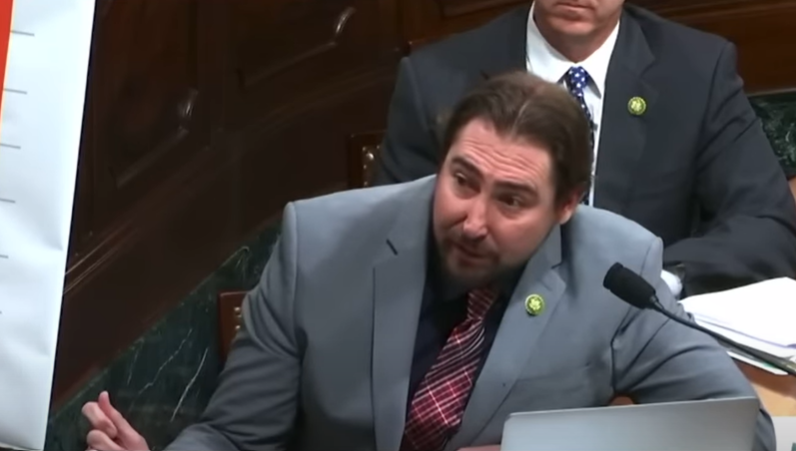
by Matthew Holloway | Aug 25, 2025 | News
By Matthew Holloway |
Congressman Eli Crane (R-AZ02) announced Friday that he has signed on to Rep. Abe Hamadeh’s ‘Preserving and Protecting the Integrity of American Elections’ Act, known as H.R. 2499. The bill is designed to codify President Donald Trump’s Executive Order 14248, which enhances U.S. election security by requiring proof of citizenship for voter registration, restricting mail-in ballot deadlines, and prioritizing enforcement against non-citizen voting.
The bill further mandates that states require proof of citizenship in the form of a government-issued ID on voter registration forms, orders the Departments of State, Homeland Security, and Social Security Administration to provide federal database access to states for determining voter eligibility, and requires a single Election Day deadline for vote tabulation. Each measure will carry the threat of withdrawn federal funding in the event of non-compliance.
In a post to X, Crane wrote, “Proud to cosponsor @RepAbeHamadeh‘s bill to codify President Trump’s executive order on election integrity. Arizonans have witnessed poorly-run elections firsthand, and this legislation addresses key vulnerabilities. We must have an efficient and trustworthy process.”
After introducing the bill, Hamadeh said in a statement at the time, “The American people deserve better. They deserve to know that their legally cast ballot is counted and accounted for. I am disappointed, but obviously not surprised that Mayes and Fontes seek to thwart the implementation of commonsense safeguards of democracy.”
He added, “As a trusted advisor once said to me, ‘election integrity never disenfranchised a single soul, but a single act of election fraud disenfranchises us all.’”
In a press release, he added, “In Arizona, we have seen what the mismanagement of voter rolls, failed election infrastructure, and corrupt courts can do to destroy voter confidence and faith in our system overall. We are taking swift action to rebuild citizens’ trust in our elections through comprehensive and meaningful election integrity legislation.”
In a post to X, the Congressman observed, “Many people say we should focus on the future and move on from 2020 and 2022… How could I(?) [K]nowing what I know? Our elections have been hijacked, they’ve been corrupted, and the American people deserve justice. It can never happen again. Election Security IS National Security.”
Matthew Holloway is a senior reporter for AZ Free News. Follow him on X for his latest stories, or email tips to Matthew@azfreenews.com.

by Matthew Holloway | Aug 24, 2025 | News
By Matthew Holloway |
While Arizona is still wrangling with the aftermath of major wildfires in the North, Governor Katie Hobbs headed to Nantucket, Massachusetts, to wine and dine out-of-state Democrat super-donors paying up to $5,500 a plate to meddle in the politics of the Grand Canyon State. The fundraising event was reportedly led by a former Ambassador whose nomination was nearly scuttled by allegations of antisemitism.
MSNBC Contributor Teddy Schleifer shared an invitation to the event in a post to X.
Tyler Bowyer, COO of Turning Point Action, lampooned the move in a post to X, writing, “another Arizona Democrat running an East Coast fundraiser.”
According to the post, the event was organized by a “host committee in formation,” which included prolific Democrat fundraiser Elizabeth Bagley, former Ambassador to Brazil under President Joe Biden and former Ambassador to Portugal under President Bill Clinton.
Bagley’s Senate confirmation was stalled in 2022 in the Senate Foreign Relations Committee on grounds of antisemitism allegations after the Washington Free Beacon found a 1998 interview in which she complained about “the influence of the Jewish lobby because there is major money involved.” She added, “The Democrats always tend to go with the Jewish constituency on Israel and say stupid things, like moving the capital to Jerusalem always comes up.” She claimed support for these Israel-related issues is due to “the Jewish factor, it’s money.”
Both Democrats and Republicans in Congress at the time were highly critical of Bagley for her remarks, to which she responded, “I regret that you would think that it was a problem. I certainly didn’t mean anything by it. It was a poor choice of words, but it was something that the interviewer had asked me, prompted by something about politics.”
Given Hobbs’ recent controversy involving the Jewish community and her veto of the Antisemitism in Education Act, which dealt with educators “promoting antisemitism or forcing students to support antisemitic viewpoints,” it is striking that Hobbs would participate in a fundraiser involving such a figure.
Matthew Holloway is a senior reporter for AZ Free News. Follow him on X for his latest stories, or email tips to Matthew@azfreenews.com.

by Jonathan Eberle | Aug 24, 2025 | News
By Jonathan Eberle |
The Sedona City Council recently voted to indefinitely shut down the city’s automated license plate reader (ALPR) program after weeks of debate over privacy, surveillance, and public safety.
At a recent special session, council members Melissa Dunn, Kathy Kinsella, Brian Fultz, Pete Furman, and Derek J. Pfaff directed city staff and police to deactivate the 11 Flock Safety cameras already installed, with one additional device awaiting installation. Mayor Scott Jablow opposed the move, while Vice Mayor Holli Ploog was absent. Roughly 50 residents attended the meeting, at times voicing strong objections to the technology.
The decision halts Sedona’s partnership with Flock Group, Inc., which had equipped the city with ALPRs to scan and log vehicle license plates as part of law enforcement investigations. Until the shutdown, only Sedona Police Department Patrol Cmdr. Chris Dowell had access to the system.
Supporters of the technology argue that ALPRs provide a valuable investigative tool, helping law enforcement identify stolen vehicles, track suspects, and improve public safety. Dowell emphasized that the cameras were not designed for broad surveillance.
“ALPR is not a mass surveillance tool; it is a focused, objective investigative asset governed by strict data retention policies and transparency protocols,” Dowell said. He noted that data collected in Sedona was stored for 30 days and that “hot list” entries—license plates flagged for criminal investigation—required supervisory approval.
But critics say the cameras still sweep up information on every passing car, raising concerns that the technology could erode civil liberties. Flock representatives acknowledged that the system can capture more than just plates—such as bumper stickers or other vehicle features—details that, while seemingly minor, could reveal political beliefs or personal affiliations.
Groups like Privacy International define “mass surveillance” as any system that collects and stores data on individuals without suspicion of wrongdoing. Civil liberties advocates warn that such technology risks normalizing constant monitoring.
The debate in Sedona echoes national concerns. In Arkansas, one homeowner recently protested a Flock camera he said photographed his property and family members, sparking a legal debate over Fourth Amendment protections. Similarly, in Scarsdale, N.Y., local officials terminated their Flock contract after residents objected to what they described as an invasive surveillance system.
Following the decision, Sedona city staff were instructed to compile a timeline of how the program was approved, establish a citizen work group, and return with recommendations for a possible pilot program that balances safety with privacy protections.
For now, the cameras will remain in place but powered off, as the community considers whether their benefits outweigh the costs to civil liberties.
Jonathan Eberle is a reporter for AZ Free News. You can send him news tips using this link.

by Jonathan Eberle | Aug 24, 2025 | News
By Jonathan Eberle |
The Arizona Senate will host the concluding session of the Joint Legislative Ad Hoc Committee on Family Court Orders on Wednesday, August 27, at 9 a.m., with parents and families invited to share personal testimony about their experiences in the state’s family court system.
Committee Chairman Mark Finchem announced that the hearing, to be held in Hearing Room 1 at the State Senate, will feature testimony from the public alongside a presentation from the Arizona Department of Child Safety (DCS). The department is expected to outline its role in custody cases, child welfare matters, and its interactions with court orders.
Finchem emphasized that the hearing marks the culmination of a series of statewide meetings aimed at collecting information and input from Arizonans affected by family court proceedings. He said the committee intends to use the findings to guide potential legislative reforms during the next session.
“The final hearing is one you won’t want to miss,” Finchem said in a statement. “If you have been impacted by the family court system or a judge has threatened you with a gag order, I strongly encourage you to come forward and share your story. This is your opportunity to provide fact-based testimony directly to lawmakers before the committee concludes its work.”
In addition to public and agency testimony, the hearing will feature a guest speaker involved in federal family court reform initiatives. Organizers say this perspective will provide broader context on efforts to increase accountability and transparency in courts handling child custody and welfare cases.
Lawmakers on the committee have framed the series of hearings as an opportunity to define the oversight responsibilities of state agencies and ensure that the family court system is responsive to the needs of Arizona families. The session will run from 9 a.m. to noon.
Jonathan Eberle is a reporter for AZ Free News. You can send him news tips using this link.

by Erik Twist | Aug 23, 2025 | Opinion
By Erik Twist |
The Common Sense Institute’s recent report, Echoes in the Halls: Arizona School Districts’ Growing Problem with Empty Buildings and Empty Buses (August 2025), quantifies a reality that many parents and educators in Arizona already sense: the traditional district school system is struggling to adapt to the new education marketplace. The report highlights a staggering mismatch between student enrollment and district assets. District schools across the state now operate with seventy-eight million square feet of unused space—capacity for more than six hundred thousand students who are not there—representing assets valued at more than twelve billion dollars. Since 2019, district enrollment has fallen by nearly fifty thousand students, while close to forty percent of incoming kindergarteners are now enrolling outside their local district.
The story of transportation is equally telling. Even as eligible bus ridership has dropped by forty-five percent, districts have added more than three thousand new vehicles, bringing annual transportation spending to more than half a billion dollars. At the same time, capital expenditures have surged by sixty-seven percent in just five years, reaching nearly nine billion dollars, with hundreds of new buildings added even as families continue to leave for other options. The evidence points to a system built on assumptions of perpetual growth, unable to pivot as students migrate toward charter schools, private schools, and homeschooling.
The question is not whether Arizona has too many empty classrooms and idle buses—the report makes that clear—but why the system finds it so difficult to adapt. The answer lies not in the commitment of teachers and administrators, but in the political structure that governs districts themselves. For more than a century, Arizona’s districts have operated under locally elected boards with broad political and taxing authority. This design once served an important democratic purpose, anchoring schools to their communities. But in an environment defined by choice and specialization, it has become a straitjacket.
What is clear for anyone with any visibility on the governance model districts operate within is that the political cycle ensures instability. Board turnover, electioneering, and the shifting priorities of competing constituencies disrupt long-term strategy. Every few years, districts are thrown off course by new agendas, new mandates, new programs, new superintendents, and a seemingly unending supply of divisive debates. In a consumer-driven education market, where parents prize clarity, stability, and quality, such volatility is profoundly counterproductive.
By contrast, Arizona’s most successful education providers—charter networks like Great Hearts and BASIS—operate under governance models insulated from political churn. Their boards are mission-driven and stable, enabling them to stay focused on long-term priorities and to deliver a coherent and trustworthy experience. Families know what to expect from a BASIS or a Great Hearts school. Each has built a distinctive value proposition and a consistent culture, refined over years without disruption from local political battles. Governance stability has been essential to their growth and attraction, and it is no accident that they are now among the most sought-after public schools in the state.
The one-size-fits-all assumption that once defined public education—that a child would simply attend the local district school—has evaporated. Today, nearly half of Arizona’s students are educated outside of their neighborhood district school. Parents are no longer defaulting to their assigned option; they are actively choosing models that align with their values and aspirations for their children. They want education providers that are both distinctive and stable—schools that can deliver excellence without being buffeted by every election cycle or politicized by the latest ideological controversy.
The traditional political governance of districts is increasingly out of sync with these expectations. It undermines the very qualities—consistency, coherence, and focus—that families prize. Meanwhile, two generations of charter operators in Arizona have demonstrated that nonprofit governance structures free from political cycles can create durable, attractive, and scalable school systems. These operators are not without challenges, but they have proven that clarity of mission and insulation from politics allow for the steady building of educational brands that families trust.
The lesson is plain: if Arizona’s districts are to thrive rather than decline, they must be unshackled from their archaic political governance model. Continuing to operate under structures designed for the early twentieth century ensures further erosion of parent confidence and continued inefficiencies in managing billions of dollars of underutilized assets. A new path is needed, one that allows districts to reimagine themselves as nonprofit education management organizations, brings simplicity and flexibility to sources and uses of capital, allows for the restructuring of real estate portfolios, and the establishment of governance models capable of long-term stewardship. It would mean shifting from political governance to mission-driven governance, from reactive cycles to strategic stability. Nothing about this would be easy. It will take a thoughtful integration of the tax and governance issues that are best considered by a new commission of governance transformation.
Such a transformation is not about abandoning public education but about liberating it. It would align districts with the same best practices that have made Arizona’s most successful charters so attractive to families. It would give teachers a more stable environment in which to do their work, free from the whiplash of shifting political priorities. It would give parents confidence that their schools are governed for the long-term benefit of students, not for short-term political gain. And it would give students schools that are full, focused, and flourishing, rather than echoing with the costs of inefficiency.
The Echoes in the Halls report demonstrates that Arizona has reached a tipping point. Families have embraced choice, and the state’s education landscape has been reshaped accordingly. What remains is for governance to catch up with this reality. The way forward is not to cling to political structures of the past, but to free districts from them so they can compete on the same terms as the schools parents are already choosing. Only then can the empty classrooms and idle buses be replaced with what every community wants most: the sound of students learning in schools built on mission, stability, and trust.
Erik Twist is the Principal Partner and President of Arcadia Education. He served as President of Great Hearts Arizona from 2017 to 2022.





